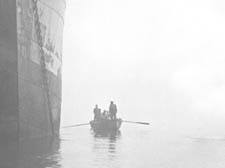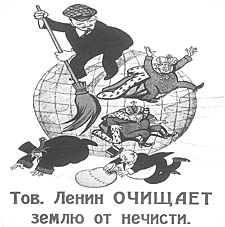|
|
 |
| |

The philosophy steamer 'Oberburgermeister Haken' which took many of Russia's intellectuals to Germany

'Comrade Lenin cleans the filth from the land' a Soviet propaganda poster from 1920 |
Lenin and the new broom of Soviet Russia
Once the newly formed USSR became stable in 1922, Lenin set about sending his enemies out of the country, writes Illtyd Harrington
SOON after Russia joined the war with the allies in June 1941, Hollywood released a satirical film starring Greta Garbo as the eponymous hero Ninotchka.
This stern faced Soviet commissar is visiting Paris to discuss trade, and defend the superiority of the communist system. Paris seems full of Russian emigres.
Grand Dukes driving taxis, cousins of the Tsar and the aristocracy cooking, scrubbing and working for a living. Tsarist generals soldiering on as hotel commissioners but all of them pining for Mother Russia and their eventual return.
To reassure the public and our new ally that no insult was intended a notice was quickly inserted into the film praising Russian war efforts and sacrifice and hoped the good humour would be enjoyed.
This tradition of exile, either to distant cold reaches of Siberia, or warmer Europe, had been a feature of 19th-century Russia. In that time, Lenin and Stalin had both been exiled to Siberia but Lenin had been forcibly living abroad from 1905 to 1917 only returning from Switzerland by courtesy of the Kaiser’s sealed train bound for St Petersburg to lead the developing revolution.
Lesley Chamberlain’s splendid history of his absolute determination to rid Russia of intellectual dissidents begins in 1922 when the Communist state was settling down.
As its leader he forced the pace. The Church and the State must be divided. Churches were ridiculed as God boxes and a state-sponsored League of the Godless launched. In a struggle for Russian souls Lenin held the winning cards and he personally wrote out the list of unacceptable thinkers, philosophers and writers.
The Red Terror of 1917-1922 had shaken Russian society. Now he wanted his 220 “enemies” out of the country.
The state even offered to pay some of their fares. Maxin Gorky, a world-famous writer pleaded with his friend Lenin to show pity and there was no sign of the brutality that would later come.
But, driven by limitless energy, constant overwork and his personal vision Lenin had a stroke. But there was no let up in the process of arrest and departure.
Two ships, the Hacken and the Preuson, were to carry their exiles and their families from St Petersburg to the fledgling Republic of Germany, the first to recognise Lenin’s state. Their anguish is sympathetically built up with their endless talk and constant analysis. At first things went well. There was a good rate of exchange in inflationary Germany and the solidarity and generous support of Russians already living there. There were a quarter of a million of them living in Berlin, as they said: “We are all Russians.”
But Hitler and Mussolini were coming out of the shadows. Gradually they dispersed to work in universities and elsewhere – Paris, Prague, and some eventually to the great US universities.
Even then Trotsky wrote of the deportations. This was a far-sighted humanity. The Czech government was particularly generous to them and many proved to be popular and effective academics, sought after in many areas of higher leaning.
Chamberlain’s meshing of memories, personal reminiscences, opinion and historical accuracy is excellent and fair and one of the most objective I have ever read. This was not the merciless pursuit of later years of the continuing story in our time of Aleksandr Solzhenitsyn and the Gulag and Pasternak Zhivago. Lenin’s practical intellectual, not physical, cleansing of his foes was brief.
Chamberlain pays a remarkable tribute to his determination to bring stability and systematic organisation to this vast land of 16 Republics which was formerly constituted as the Soviet Union on New Year’s Eve 1922.
Lenin died at the end of January 1924, aged 53. Chamberlain makes the interesting comparison with the French architect Le Corbusier. She sees both men believing in life which is organised on the basis of efficient living.
As well as this she says Lenin embodied the spirit of the enlightenment in Soviet terms.
A novel conclusion to a highly readable forgotten chapter in European History. |
| |
|
 |
|